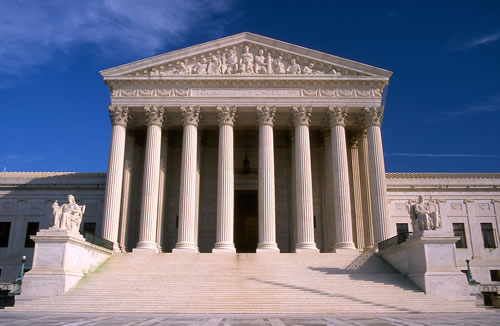

Share
The U.S. Supreme Court will decide two cases with potentially devastating effects on workers. The first – to be heard next week – would deprive workers of the right to sue employers who steal their wages or otherwise violate labor law. The other – which is yet to be scheduled – would undermine the power of workers to bargain collectively through unions.
On Monday, the court will hear arguments in Murphy Oil v. NLRB and two related cases, where they could find that workers must take all disputes with bosses – including disputes covered by labor law, such as over wages and working conditions – to mandatory arbitration, giving up their right to sue under labor law if they lose.
Workers at three firms – Murphy Oil and its 1,000 gas stations, Epic Systems and the accounting firm of Ernst & Young – all took part in class action lawsuits, saying their firms illegally denied them overtime pay. The National Labor Relations Board sided with the workers and threw out mandatory arbitration of their complaints. But the firms appealed.
The Department of Justice, under President Obama, defended the NLRB, which has regularly thrown out mandatory arbitration agreements that some bosses force workers to sign as conditions of employment. But this week, the Trump administration’s Department of Justice reversed that position and backed the companies.
“If the Supreme Court sides with corporate interests and the Trump administration, workers will likely be forced to sign away the long-held right to join together with their co-workers to address workplace disputes,” said Celine McNicholas, counsel for the Economic Policy Institute, a Washington, D.C.-based think tank. McNicholas, who has published a long analysis of the case, said arbitration cases are costly for individual employees and are usually won by employers.
“Workers also depend on collective and class actions to enforce many workplace rights. Employment class actions have helped to combat race and sex discrimination and are fundamental to the enforcement of wage and hour standards,” McNicholas wrote.
“Without the ability to aggregate claims, it would be very difficult, if not impossible,” for workers, especially low-wage workers, to hire lawyers, she said. “That is the power of class and collective action suits: They let workers pool their claims, making it possible for an attorney to earn enough to make the case worth pursuing.”
The second case, Janus v. AFSCME, would undermine worker rights by depriving labor unions of the resources required for fair representation.
This week, the court agreed to hear the case, but has not yet set a date. The case would allow public sector workers who are covered by union contracts – but do not wish to be union members – to enjoy the full benefits of a contract without paying dues.
The appellant, Mark Janus, argues that he should not have to pay an “agency fee” to the Illinois AFSCME Council 31 to cover the cost of representing him at the bargaining table and in disciplinary proceedings. If successful, he and 7 million other state and local government workers across the country would become what the labor movement calls “free riders.”
The case marks the second attempt by the so-called National Right to Work Committee to undermine unions. The first, Friedrichs v. California Teachers Association, failed on a 4-4 tie in the High Court last year after Associate Justice Antonin Scalia died.
The newest Supreme Court justice, Trump appointee Neil Gorsuch, is expected be a key vote in both cases.
This week’s news that the court would hear the Janus case prompted strong reactions from unions, with Laborers International Union President Terry O’Sullivan calling it “a blatant attack to rig the economy against workers.”
In Minnesota, Education Minnesota President Denise Specht – leader of the state’s 80,000-member educators’ union – decried right wing efforts to fund legal challenges to worker rights.
“The billionaires and their foundations pay for lawsuits like Janus and right-to-work laws because they want to weaken unions by forcing them to provide expensive services for free,” Specht said. “Educators and other people who work for the public see through the rhetoric. We’re prepared, unified and ready to resist on behalf of the parents and communities who depend on us.”
Nationally, AFSCME, the American Federation of Teachers, the National Education Association and the Service Employees International Union issued a joint statement emphasizing the same themes.
“This case is yet another example of corporate interests using their power and influence to launch a political attack on working people and rig the rules of the economy in their own favor,” said AFSCME President Lee Saunders, whose union represents more state and local workers than any other.
“When working people are able to join strong unions, they have the strength in numbers they need to fight for the freedoms they deserve, like access to quality health care, retirement security and time off work to care for a loved one. The merits of the case, and 40 years of Supreme Court precedent and sound law, are on our side.”
This article is adapted, in part, from two reports by Mark Gruenberg of Press Associates Union News Service.

